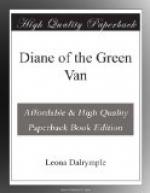“Why must we talk in riddles?” cried Diane with a flash of impatience. “Why does Ronador fear for his son? Where is the candlestick? And the paper? Who found it?”
“Carl found it,” said Philip. “It was written nearly a quarter of a century ago, by one—Theodomir of Houdania.”
Diane glanced in utter mystification at Ronador’s ashen face—there was a great fear in his eyes—and thence to Baron Tregar.
“Excellency,” she appealed, “it is all very hard to understand. Who is Theodomir? And why must his life touch mine after all these years?”
The Baron cleared his throat.
“Let me try to make it simpler,” he said gravely. “Theodomir, Miss Westfall, was a lovable, willful, over-democratic young crown prince of Houdania who, many years ago, refused the responsibilities of a royal position whose pomp and pretensions he despised—quoting Buddha—and fled to America where in the course of time he married, divorced his wife and later died—incognito. He was Ronador’s cousin, and his flight shifted the regency of the kingdom to Ronador’s father.”
“Yes,” said the girl steadily, “that is very clear.”
“Theodomir married—and divorced—your mother,” said Philip gently.
Diane grew very white.
“And even yet,” she said bravely, “I—can not see why we must all be so worked up. There is more?”
“Yes. Later, after her divorce from Theodomir, your mother married Norman Westfall—”
“My father,” corrected Diane swiftly.
Philip looked away.
“Her second marriage,” he said at last, “was childless.”
“Philip!” Diane’s face flamed. “And I?”
“You,” said Baron Tregar, “are the child of Theodomir.”
In the strained silence a bird sent a sweet, clear call ringing lightly over the water.
“That—that can not be!” faltered Diane. “It—it is too preposterous.”
“I wish to Heaven it were!” said Philip quietly. “Whether or not it was Theodomir’s wish that his daughter be reared, in the eyes of the world, as the daughter of Norman Westfall, to protect her from any consequences incident to his possible discovery and enforced return to Houdania, it is impossible to say. Hating royalty as he did, he may have sought thus to shield his daughter from its taint. Why he weakened and consigned the secret to paper—how or when he hid it in an ancient candlestick in the home of Norman Westfall, remains shrouded in utter mystery. It is but one of the many points that need light.”
Again the Baron cleared his throat.
“And,” said he, “since unwisely, Miss Westfall, for eugenic reasons, we grant a certain freedom of marital choice to our princes—since wisely or not as you will, the Salic Law does not, by an ancient precedent, obtain with us, and a woman may come in the line of succession, the danger to Ronador’s little son, is, I think, apparent.”




